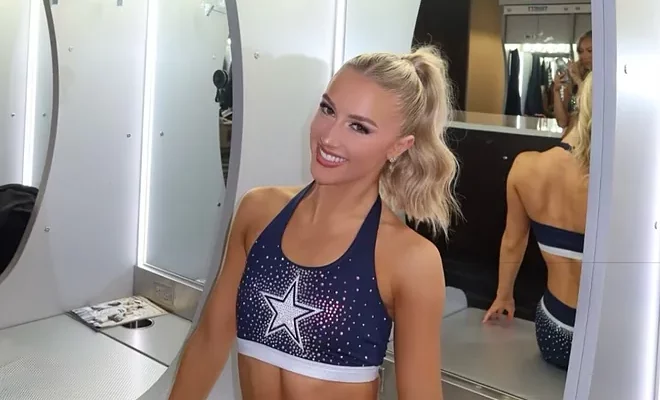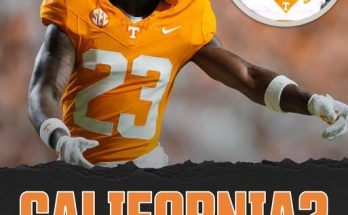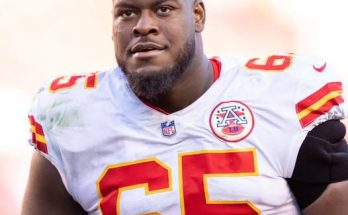When Faith Ward stepped onto the field in full Dallas Cowboys Cheerleaders (DCC) uniform, she wasn’t just there to perform intricate routines with dazzling precision and megawatt energy. She was there to make history—one high ponytail at a time. For decades, the DCC has set the gold standard for NFL cheerleading: iconic blue-and-white uniforms, perfectly styled hair cascading in voluminous curls, and a performance culture steeped in pageantry, poise, and tradition. But in 2025, Faith Ward redefined what that tradition could look like—and in doing so, she became a symbol of evolution inside one of the most recognizable institutions in American sports.
Faith’s decision to wear her natural hair in a sleek, bouncing ponytail might seem simple at first glance. But within the highly polished world of the DCC, it represented a tectonic shift. For years, uniformity in appearance was not only encouraged—it was strictly enforced. All cheerleaders were expected to maintain a certain look, from their hair texture and style to their makeup and even the length of their eyelashes. The aesthetic was so ingrained that former DCC alumni have admitted to undergoing hours of prep time just to meet the standards before taking the field. Enter Faith Ward: a confident, unapologetic Black woman with poise, performance chops, and a deep understanding of her platform. Her ponytail wasn’t just a hairstyle—it was a cultural statement, a declaration of authenticity, and an assertion of individuality.
The ripple effects were immediate. Cameras zoomed in. Fans tweeted their support. Social media lit up with praise, admiration, and curiosity. “Is that a DCC with a ponytail?” one post asked. “Yes, and she’s SLAYING IT,” another replied. Within days, Faith Ward’s name trended across sports and entertainment media, signaling that her small act of defiance—done with elegance and respect—had sparked a conversation much larger than football.
This wasn’t the first time NFL cheerleading faced questions of representation and conformity. In recent years, teams have been challenged on everything from pay disparities to gender inclusivity to racial representation. But the Dallas Cowboys Cheerleaders have long stood at the epicenter of these debates, precisely because of their elite status. Often referred to as “America’s Sweethearts,” they carry an almost mythic quality. They aren’t just cheerleaders—they’re ambassadors, icons, and role models. Every appearance, every move, every photo shoot is choreographed to perfection. That level of exposure can be both an incredible honor and an intense burden. So when someone like Faith Ward decides to challenge one of its longest-standing norms, it’s no small feat.
Faith’s rise within the DCC organization has been swift and impressive. Known for her incredible technique, unmatched stamina, and charismatic stage presence, she quickly became a fan favorite. But what set her apart wasn’t just her athleticism—it was her willingness to bring her full self into every performance. Coaches noted her leadership during rehearsals, her camaraderie with teammates, and her deep respect for the legacy she was stepping into. So when she approached team officials about maintaining her ponytail, it wasn’t out of rebellion—it was out of purpose.
That decision didn’t come lightly. Faith had grown up watching the DCC like so many young girls. She admired their unity, their power, their beauty. But as a Black woman, she also knew that her beauty often existed outside the lines of traditional Western standards. Straight hair, loose curls, and blonde highlights were the visual default. Natural styles—braids, afros, coils, twists—were rarely seen on such a visible stage. And while some teams had begun embracing a broader spectrum of looks in recent years, the DCC’s image remained largely untouched. Faith was determined to change that without compromising the team’s spirit.
Internally, the decision sparked discussion. Some within the organization feared that altering a visual trademark might dilute the brand. Others argued that expanding the visual identity of the cheerleaders would strengthen it. Ultimately, team leadership made a decision that will likely be remembered for years: they supported Faith. It was a subtle but seismic endorsement that individuality and legacy could coexist. And when Faith took the field with her ponytail swinging with every high kick, the crowd roared—not just for the choreography, but for what it represented.
Young girls in the crowd noticed. So did mothers, grandmothers, and fans who had long felt on the margins of the DCC experience. For the first time, they saw someone who looked like them not only participating in the tradition—but redefining it. Representation, long spoken of in abstract terms, had finally found its moment in the middle of AT\&T Stadium under the glare of national spotlights.
Faith Ward’s influence is extending far beyond Dallas. Already, cheer squads at high schools and colleges across the country are citing her as an inspiration. “I used to think I had to change my look to fit in,” one college cheerleader from Georgia wrote on Instagram. “But then I saw Faith Ward being herself and shining brighter than ever. Now I know I can be me, too.” That kind of grassroots ripple effect is exactly what happens when the right person challenges the status quo with authenticity and grace.
The DCC has since quietly updated portions of its handbook, allowing for more flexibility in hair styling and personal expression. While not a wholesale overhaul, it’s a step toward embracing the idea that the iconic look of the cheerleaders can evolve without losing its essence. The blue stars and white fringe still dazzle. The boots still stomp in unison. But within that synchronized magic, there’s now space for individuality—a space carved out by one trailblazing woman with a ponytail and a purpose.
Faith, for her part, remains humble about the impact she’s had. In interviews, she often shifts credit to the generations of women before her who paved the way in other ways: from the first Black cheerleaders to break racial barriers to the women who fought for better pay and professional treatment. “I didn’t do this to make headlines,” she said in a recent media appearance. “I just wanted to be myself and show that being yourself is enough—even in places with a lot of tradition.”
Yet for all her humility, the cultural significance of what she’s done can’t be overstated. In an era where identity and representation are being negotiated across every level of society—from boardrooms to classrooms to locker rooms—Faith Ward’s ponytail stands as a symbol of subtle revolution. It’s not flashy. It’s not defiant. It’s simply real. And sometimes, real is the most revolutionary thing of all.
The legacy of the Dallas Cowboys Cheerleaders will always be tied to precision, beauty, and American pop culture. But now, thanks to Faith Ward, it’s also tied to evolution, courage, and self-expression. Her contribution may not come with statues or banners, but it will live in the quiet confidence of every performer who knows they can bring their full self into the spotlight. Because of her, the field is a little wider, the rules a little more flexible, and the standard a little more inclusive.
Faith Ward didn’t just wear a ponytail. She wore a new era. And in doing so, she reminded the world that tradition isn’t about staying the same—it’s about growing in ways that honor the past while embracing the future. The Dallas Cowboys Cheerleaders may have taught generations how to sparkle and shine. But Faith Ward taught them how to do it on their own terms.



